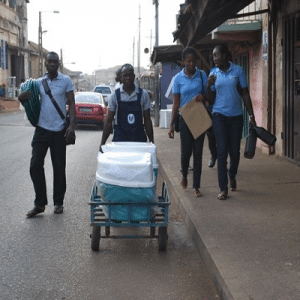
Agriculture
January 19, 2024
Clean Team Toilet and Clean Team Toilet Waste Management Service
Read SolutionImplemented by
Clean Team Ghana
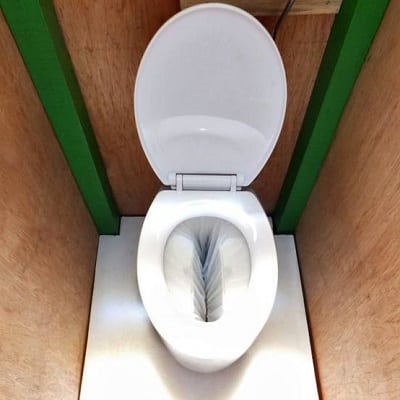
Updated on December 20, 2023
·Created on September 30, 2018
The Loowatt toilet is a dry-toilet that seals waste into a biodegradable film for transport and further processing, creating either energy or fertilizer.
Loowatt toilets are versatile waterless-flush sanitation systems that seal waste into a portable cartridge using biodegradable film. The cartridges prevent odors and enable periodic emptying by a team of waste-collectors. Once waste is collected it is processed anaerobically to produce biogas, electricity and fertilizer. Overall this system is obtained with an initial monetary deposit and maintained with a monthly fee for emptying and replacement of the biodegradable film.
There are both permanent and temporary installation options. The Home toilet is equipped with a manual flush. The Zen toilet is portable and equipped with an electric flush and a remote monitoring system that signals capacity alerts for the collection services.
In Madagascar each toilet requires a 16 USD deposit for use rather than purchase; the technology remains owned by Loowatt. In addition, a service fee of approximately 4 USD is charged each month for maintenance and materials.
Target SDGs
SDG 6: Clean Water and Sanitation
Market Suggested Retail Price
$20.00
Target Users (Target Impact Group)
Household, Community
Distributors / Implementing Organizations
Loowatt Ltd
Competitive Landscape
Direct competitors include Laveo Dry Flush Toilet.
Countries
Madagascar, Philippines, United Kingdom
Manufacturing/Building Method
Toilets are constructed locally using available materials and are integrated with imported Loowatt waste-sealing units.
Intellectural Property Type
Patent
User Provision Model
In partnership with local governments and organizations, Loowatt provides waterless toilets to households and communities in Madagascar, the Philippines, and the UK.
Distributions to Date Status
By January 2021, over 1,000 toilets have been distributed.
Toilet type
Container-based service
Evacuation method
Dry
Storage conditions
Container storage
Capacity (L)
64 L storage, during operation should not exceed 25 L
Time until emptying
Emptying by staff as-needed
Design Specifications
The toilet was designed to provide sanitary toilets where water is not accessible for flushing.
Loowatt utilizes a biodegradable film to seal waste. This prevents odors and improves safety by eliminating user contact with the waste.
Refills & maintenance: There are two alert mechanisms to indicate the container needs to be replaced: the Loowatt app or color-coded polymer film.
Loowatt employs a closed-loop process to transform human waste into biogas for electricity and fertilizer for crops. The waste is collected by a service team and transported to a waste processing facility. The film is separated from the waste so that the waste can be treated using anaerobic digesters to produce the biogas and fertilizer products.
Technical Support
The toilets are serviced and emptied periodically by trained staff.
Replacement Components
The loowatt toilets require a monthly fee paid by users which covers the cost of repairs and components of the toilet mechanism that need replacing.
Lifecycle
Over 10 yearsInterview with designer
Manufacturer Specified Performance Parameters
Loowatt's target goals are to provide household and community sanitation services that are locally managed and then to scale production to ultimately meet the sanitation needs of growing urban communities. Loowatt aims to serve over 1 million people in under-served communities by 2022, in addition to over 5 million people annually throughout the EU.
Vetted Performance Status
As of 2021, over 252,000 people have used Loowatt toilets, 745 tons of waste has been processed, and 56 MWh of energy has been generated.
Safety
The Loowatt systems were designed to ensure that users did not have contact with the waste deposited into toilets. One safety factor that is still being considered is the transfer of waste from the toilet-containers to transportation services, which can result in sewage being spilled into yards.
Complementary Technical Systems
The toilets are integrated with a waste-processing facility built in Madagascar's capital, which processes the waste collected from each of the company's leased-toilets every six months.
Academic Research and References
Siegel, R.P., 2015, Energy otherwise flushed away: a waterless toilet can provide the feedstock for a biogas digester, Mechanical Engineering-CIME 137(9): 1-10.
Ulrich, L., Salian, P., Saul, C., Jüstrich, S., Lüthi, C., 2016, Assessing the Costs of on-Site Sanitation Facilities, Eawag Aquatic Research.
Larsson, E., Nilsson, M., Towards sustainable sanitation in slum areas: A field study in Mumbai, Linkopings University.
Zeldovich, L., 2017, Behold the daring, water-free future of the modern toilet. Tech & Innovation, Quartz.
CORDIS – EU, 2016, European Expansion for Circular Economy Off-Grid Toilets. Available: https://cordis.europa.eu/project/id/728177
Goal 6. Available: https://sdgs.un.org/goals/goal6
Compliance with regulations
NoneInterview with designer
Evaluation methods
The toilets are evaluated by users for functionality and appropriateness, and feedback is given to the design team.Interview with designer
Other Information
Loowatt toilets were used by staff at the 2018 royal wedding.
Additional schematic information can be found in Eawag’s Assessing the Costs of on-Site Sanitation Facilities study report.

Agriculture
January 19, 2024
Implemented by
Clean Team Ghana
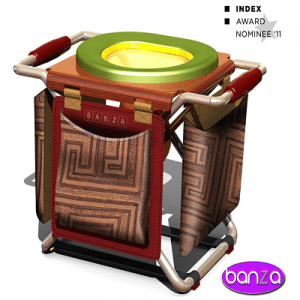
Agriculture
August 8, 2024
Implemented by
Patrick Kiruki, Banza Sanitation

Agriculture
December 19, 2023
Implemented by
Wostman
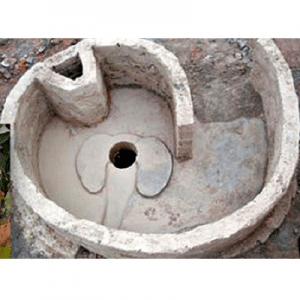
Agriculture
August 13, 2024
Implemented by
The Africa Trust
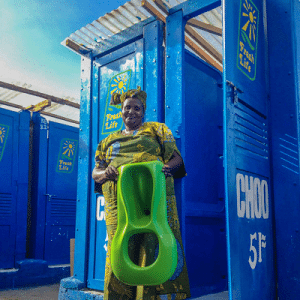
Agriculture
August 17, 2024
Implemented by
Sanergy
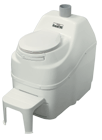
Agriculture
August 13, 2024
Implemented by
Sun-Mar
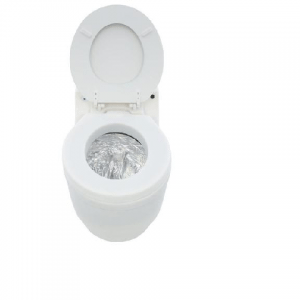
Agriculture
December 20, 2023
Implemented by
Dry Flush
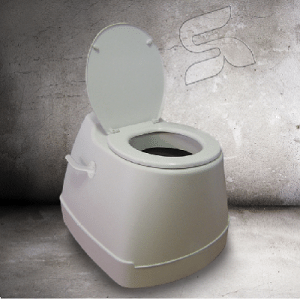
Agriculture
December 21, 2023
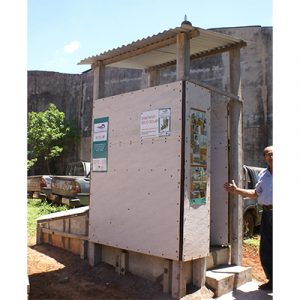
Agriculture
January 17, 2024
Implemented by
Centro de Desarrollo del Habitat y el Medio Ambiente (CEDES/Habitat)
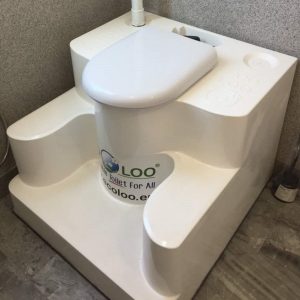
Agriculture
August 16, 2024
Implemented by
Ecoloo
Have thoughts on how we can improve?
Give Us Feedback